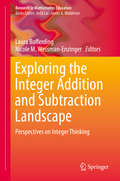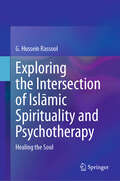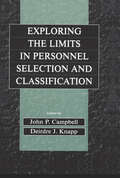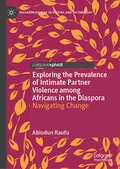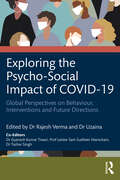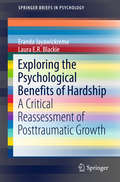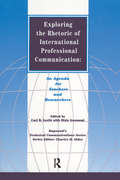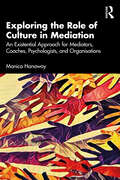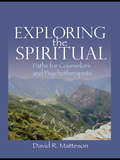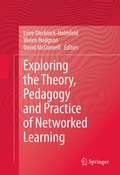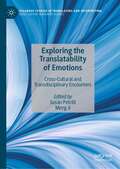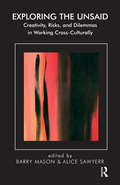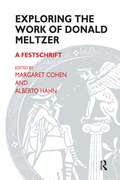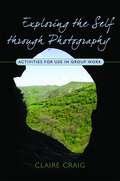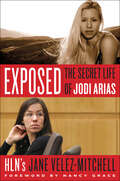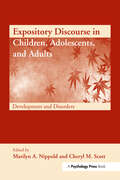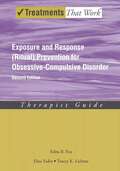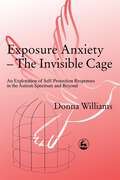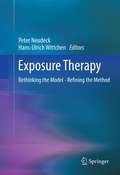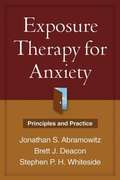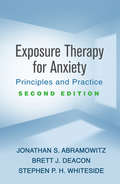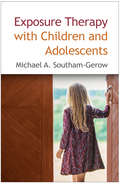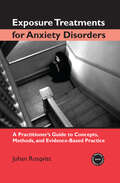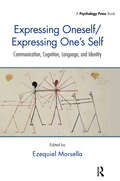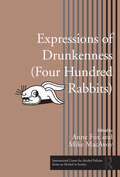- Table View
- List View
Exploring the Integer Addition and Subtraction Landscape: Perspectives on Integer Thinking (Research in Mathematics Education)
by Laura Bofferding Nicole M. Wessman-EnzingerOver the past few decades there has been increased interest in how students and teachers think and learn about negative numbers from a variety of perspectives. In particular, there has been debate about when integers should be taught and how to teach them to best support students’ learning. This book brings together recent work from researchers to illuminate the state of our understanding about issues related to integer addition and subtraction with a goal of highlighting how the variety of perspectives support each other or contribute to the field in unique ways. In particular, this book focuses on three main areas of integer work: students’ thinking, models and metaphors, and teachers’ thinking. Each chapter highlights a theoretically guided study centered on integer addition and subtraction. Internationally known scholars help connect the perspectives and offer additional insights through section commentaries. This book is an invaluable resource to those who are interested in mathematics education and numerical thinking.
Exploring the Intersection of Islāmic Spirituality and Psychotherapy: Healing the Soul
by G. Hussein RassoolThis book examines the intersection of Islāmic spirituality and psychotherapy, analyzing how Islāmic principles can be integrated into therapeutic practices to foster mental, emotional, and spiritual health. Through a comprehensive exploration of Islāmic teachings and contemporary psychological theories, it aims to offer valuable insights for both practitioners and students of Islāmic psychotherapy. The book starts by analyzing the convergence of Islāmic spirituality and psychotherapy, discussing the importance of decolonizing psychological knowledge and presenting the foundations of Islāmic psychotherapy. Next, it analyzes various psychological approaches – such as psychoanalytic therapy, client-centred therapy and cognitive-behavioral therapy – and discusses the congruences or dissonances of each approach with Islāmic spirituality. Finally, the book examines the relationship between emotion and mental health from an Islāmic perspective and reflects on the integration of Islāmic spirituality in psychotherapy, providing practical strategies and tools for Islāmic psychotherapists. Exploring the Intersection of Islāmic Spirituality and Psychotherapy: Healing the Soul will be an invaluable resource for mental health practitioners such as counsellors and psychotherapists, as well as for scholars and students, interested in learning how to bridge the gap between Islāmic spirituality and psychotherapy, offering insights and guidance for those seeking to integrate these domains and developing a deeper understanding of Islāmic psychotherapy.
Exploring the Limits in Personnel Selection and Classification
by John P.Campbell and Deirdre J.KnappBeginning in the early 1980s and continuing through the middle 1990s, the U.S. Army Research Institute for the Behavioral and Social Sciences (ARI) sponsored a comprehensive research and development program to evaluate and enhance the Army's personnel selection and classification procedures. This was a set of interrelated efforts, collectively known as Project A. Project A had a number of basic and applied research objectives pertaining to selection and classification decision making. It focused on the entire selection and classification system for Army enlisted personnel and addressed research questions that can be generalized to other personnel systems. It involved the development and evaluation of a comprehensive array of predictor and criterion measures using samples of tens of thousands of individuals in a broad range of jobs. The research included a longitudinal sample--from which data were collected at organizational entry--following training, after 1-2 years on the job and after 3-4 years on the job. This book provides a concise and readable description of the entire Project A research program. The editors share the problems, strategies, experiences, findings, lessons learned, and some of the excitement that resulted from conducting the type of project that comes along once in a lifetime for an industrial/organizational psychologist. This book is of interest to industrial/organizational psychologists, including experienced researchers, consultants, graduate students, and anyone interested in personnel selection and classification research.
Exploring the Prevalence of Intimate Partner Violence among Africans in the Diaspora: Navigating Change (Palgrave Studies in Victims and Victimology)
by Abiodun RaufuThis book investigates the high prevalence of intimate partner violence (IPV) among African immigrants across the world, addressing unique cultural contexts, acculturative stress, and identity which shapes their experiences. The author examines how migration-related stress, cultural norms, and systemic challenges intersect to influence intimate partner violence dynamics uniquely within the African diaspora. The book utilizes three theoretical frameworks to investigate this question: Urie Bronfenbrenner&’s ecological systems theory; John Berry&’s acculturation stress theory; and Kimberlé Crenshaw&’s intersectionality theory. This book situates the experiences of this unique immigrant population in the literature on IPV. It also provides global context by situating African diaspora experiences within broader discussions of intimate partner violence across immigrant populations. The author highlights the resilience and coping mechanisms of African IPV survivors and offers culturally sensitive strategies for prevention and intervention pathways to empowerment and healing.
Exploring the Psycho-Social Impact of COVID-19: Global Perspectives on Behaviour, Interventions and Future Directions
by Rajesh Verma UzainaThis comprehensive resource provides a one-stop information repository, exploring all psychological aspects of Covid-19. Divided into three sections, the book covers the psycho-social impact on society and individuals and our collective cooperative behaviour, as well as philanthropic efforts, coping strategies and technological interventions, and how lessons learned will help in preparedness for the future. Including case studies and the latest research from diverse scientific studies across different regions, this book examines how psycho-social paradigms changed as a result of the pandemic, and left their watermark on the human psyche. It also explores the coping strategies adopted to deal with this common aggressor and how the techniques varied in accordance with social, cultural and geographical factors. The final section offers new insights for the future, highlighting the psychological infrastructure required, the type of preparedness and handling strategies necessary to mitigate the impact of any future biogenic pandemics. Combining theory and practical application, this is a valuable reading for academics and researchers as well as practising psychologists, clinical psychologists, and law-makers who are concerned with mental health.
Exploring the Psychological Benefits of Hardship
by Eranda Jayawickreme Laura E.R. BlackieCan adversity lead to enduring positive change across the lifespan? Providing a thoughtful and considered exploration of this question, this book presents a critical reassessment of posttraumatic growth, based on correcting prior theoretical and methodological limitations in the current research. Its core argument is that posttraumatic growth should be reconceptualized as positive personality change, and thus should be studied using novel methodological approaches from the field of personality psychology. Broadly, this argument is put forward in five progressive sections. Beginning by giving a conceptual and interdisciplinary overview of posttraumatic growth as a phenomenon, the volume then reviews the current academic conceptualization of posttraumatic growth and makes a case for a 'reset' in the research. The next section maintains that posttraumatic growth is in fact a form of positive personality change and should be analyzed using personality science methodology. Using positive personality change as a theoretical foundation for posttraumatic growth, the following two sections look at posttraumatic growth in context. It is explored both in the long term, such as in the development of reflective knowledge and wisdom, and in specific situations such as with refugees in Sri Lanka and survivors of the Rwandan genocide. Lastly, Exploring the Psychological Benefits of Hardship: A Critical Reassessment of Posttraumatic Growth concludes by offering recommendations for scholars and researchers that will improve the quality of research on posttraumatic growth, and will advance this important and worthy field.
Exploring the Rhetoric of International Professional Communication: An Agenda for Teachers and Researchers (Baywood's Technical Communications)
by Carl R. Lovitt Dixie GoswamiPresents a collection of fourteen essays that responds to the need for a more rhetorical conception of professional communication as an international discipline. This book challenges the adequacy of relying on preconceived notions about the factors that determine discourse in international professional settings.
Exploring the Role of Culture in Mediation: An Existential Approach for Mediators, Coaches, Psychologists, and Organisations
by Monica HanawayThis new book explores the historical development of mediation (conflict resolution) from a cultural and existential perspective, and considers the cultural challenges involved for a mediator.The author, Monica Hanaway, has been mediating disputes across cultures for several years. She sets the scene for exploring the role culture plays in conflict and its resolution by explaining what mediation is and what we understand by the word ‘culture’. From there she explores what mediators need to keep in mind when considering culture in the context of mediation. Within this, she covers such topics as the merits of using interpreters, and the pros and cons of using mediators from the same culture as the disputants. The final section of the book comments on what mediation professional and training bodies need to do to raise the profile of the cultural aspects in conflict.Written by an experienced practitioner, Exploring the Role of Culture in Mediation will be of particular interest to all mediators, coaches, and psychologists, those interested in applying philosophy to resolving conflict, and those considering mediation.
Exploring the Spiritual: Paths for Counselors and Psychotherapists
by David R. MattesonGain solid empirical findings to understand your own spiritual development To significantly impact clients&’ spirituality and use the spiritual strengths the client possesses to facilitate their move toward health, a counselor must be willing to explore his or her own spiritual development. Exploring the Spiritual: Paths for Counselors and Psychotherapists provides cognitive information grounded in the empirical findings of social science, as well as experiential material which encourages the counselors&’ own spiritual quest. This invaluable source clarifies the interface between the counselor&’s spirituality and the client&’s, and allows the spiritual dimension to emerge appropriately in the counseling process. Exploring the Spiritual: Paths for Counselors and Psychotherapists provides challenging questions and exercises that lead the counselor or psychotherapist through a personal exploration to attain the maturity of development needed to facilitate the client&’s spiritual growth. The text, written in an accessible narrative style, features helpful case studies and personal anecdotes to illustrate the concepts and processes described. Each chapter includes an overview of an issue, develops an argument or position, and presents a focused exploration of some relevant empirical research that is presented in a context that helps the reader see its personal implications. The final section leads the reader through exercises and experiments, helping them to focus on the counselor&’s own inner experience or encouraging the counselor to experiment with new behaviors. This insightful resource encourages the counselor to work directly with the client&’s spiritual experiences and conceptualizations without imposing on the client the beliefs of the counselor. Topics discussed in Exploring the Spiritual: Paths for Counselors and Psychotherapists include: models of spiritual development steps toward spiritual maturation the contribution of crises in belief and in values the physical-emotional self, and the contribution of passion and sexuality overcoming the divisiveness of age, race, gender, sexual orientation, and culture coping with suffering discovering one&’s own paths to the spiritual Exploring the Spiritual: Paths for Counselors and Psychotherapists is a valuable resource for counselors, psychotherapists, counselor educators, and graduate students in psychology, counseling, psychotherapy, social work, and psychiatry.
Exploring the Theory, Pedagogy and Practice of Networked Learning
by David Mcconnell Lone Dirckinck-Holmfeld Vivien HodgsonThis book will be based on a selection of high quality research papers presented at the Networked Learning Conference, May3-4, 2010. The Networked Learning Conference is an international, research-based conference. Since its inception in 1998 the conference has developed a strong following by international researchers. In addition it is well supported by practitioners, managers and learning technologists interested in contributing to and hearing about research in this area. The conference is considered a major event in the international 'technology enhanced learning' conference circuit. This edited volume presents cutting edge research that will explore current trends and advances in research on networked learning, technology enhanced learning and e-learning.
Exploring the Translatability of Emotions: Cross-Cultural and Transdisciplinary Encounters (Palgrave Studies in Translating and Interpreting)
by Susan Petrilli Meng JiThis book offers an in-depth, cross-cultural and transdisciplinary discussion of the translatability of social emotions. The contributors are leading philosophers, semioticians, anthropologists, communication and translation theorists from Europe, America and Australia. Part I explores the translatability of emotions as a culturally embedded social behaviour that requires a contextualized interpretation of their origins and development in different social and cultural settings. These studies make useful preparations for the studies introduced in Part II that continue investigating the cultural and sociological influence of the development of social emotions with a special focus on the dialogical relation to the body and to others. Part III presses on delving into specific types of emotions which underscore social interactions at both the community and individual levels, such as dignity, (im-)politeness, self-regard and self-esteem. Finally, Part IV offers a further development on the preceding parts as it discusses problems of translation, expressibility and mass-medial communication of emotions. This book will engage translation scholars as well as those with a broader interest in the study and interpretation of emotions from different fields, perspectives and disciplines.
Exploring the Unsaid: Creativity, Risks and Dilemmas in Working Cross-Culturally (The Systemic Thinking and Practice Series)
by Nancy Boyd-Franklin Barry Mason Alice SawyerrThe editors and contributing authors of this volume have taken a truly pioneering and courageously challenging look at the state of cross-cultural theory and practice. In confronting directly and honestly a broad range of cross-cultural issues they have succeeded in formulating a thoughtful and innovative framework for progress in this complex and demanding field. Amongst the numerous issues examined with thoroughness and insight, the following may be identified as of central importance: Perceptions and experiences of 'sameness' and 'difference'; 'collectivist' and 'individualist' cultural tendencies; internalised and institutionalised racism; religious beliefs and spiritualities; kinship roles and familial values; sexism, poverty and beliefs about mental health. Supported and illustrated with excellent clinical material these issues receive impressive exploration. Probing and perceptive about the relationships between clients and practitioners and between mental health professionals themselves, this volume offers both conceptually and practically a genuinely enriching and groundbreaking guide that points the way forward in a spirit of confidence and hope.
Exploring the Work of Donald Meltzer: A Festschrift
by Donald MeltzerThis book is a tribute to Donald Melzer's extraordinary contribution to psychoanalysis. It includes many of the papers given at the Tavistock Centre in London to celebrate Meltzer's 75th Birthday. Among the contributions, Margaret Rustin and Michael Rustin write on the work of Samuel Beckett; Gianna Williams elaborates upon Meltzer's thinking about the meeting of mother and baby; Didier Houzel discusses the aesthetic conflict and its connection with beauty and violence; and the Psychoanalytic Group of Barcelona describe their experience in working with Meltzer as a visiting supervisor. There are also several papers discussing the clinical relevance of Meltzer's thinking, particularly in work with children and adolescents.Apart from these papers, the book also contains a candid review by Meltzer of his own writing and thinking. This book provides a unique set of perspectives on his work and influence, and the sheer diversity of fields in which his thinking is now being used. It will surely be of continuing value to anyone interested in the state of psychoanalysis
Exploring the self through photography
by Claire CraigPhotography shows us how to look at things from different perspectives, to reflect, to communicate and to express ourselves in a way that goes beyond words. The creative and introspective qualities of this accessible arts medium make it an ideal tool for use in therapeutic contexts. In this book, Claire Craig explores how professionals working with groups can use photography to promote self-exploration and positive change. She explains how the technique works, who it can help, and how to set up and run a group. Each chapter revolves around a key self-development theme, such as communication, reflection, relationship-building and self-esteem, and contains activities which are suitable for all ages and abilities. For each activity, requirements are clearly specified, and both a warm-up and extension activity offered. Along the way, examples of photographs taken by participants in response to particular themes, and the explanations which accompany them, are provided as inspiration. This practical guide can be used in group work across a broad range of contexts, including in schools, colleges, youth groups, community settings, residential care, in-patient and day hospitals. It will be of interest to occupational therapists, arts therapists, social workers, teachers and any other practitioners interested in ways of promoting personal development through creative means.
Exposed: The Secret Life of Jodi Arias
by Jane Velez-MitchellOn June 9, 2008, the butchered body of Travis Alexander was found in his Mesa, Arizona home. The grisly nature of his death made instant headlines: with twenty-nine knife wounds, his throat slit, and a gunshot to the head, Travis was left to die. The prime suspect in the case was Alexander’s ex-girlfriend, the attractive and soft-spoken Jodi Arias. Though Arias initially said that she was nowhere near the scene of the crime, little about this case was as it seemed, and before long she had been caught lying to police. As the investigation progressed, her lies evolved multiple times before finally resting on an appalling claim: she had killed Travis in self-defense. Along the way, startling details emerged about the Mormon couple’s relationship, and soon graphic stories of their lurid sexual encounters and jealousy-driven blowouts revealed a dark side to their life together. These revelations launched a trial filled with sex and deception but also raised substantial questions about Arias’s deceit, as people from across the country struggled to understand the bizarre world of Jodi Arias.Now, award-winning broadcast journalist and bestselling author Jane Velez-Mitchell, a veteran of some of the most storied court cases in recent memory, goes behind the scenes of the trial and into the mind of a killer. Using insider accounts from friends who knew Travis and Jodi, Velez-Mitchell turns her sharply-focused lens on Arias and offers her seasoned perspective on the case’s most pressing questions. Separating fact from fiction, she reports on the bizarre and explicit stories that have both shocked and fascinated the American public—from Jodi’s romantic history before meeting Travis, to their torrid sex life together, to the complicated role their Mormon faith played in the relationship’s demise. With unbridled access to the evidence and the case’s key players, Velez-Mitchell unearths Jodi’s contentious life with those closest to her, examining the paranoid and erratic behavior behind each relationship and illustrating the disturbing pattern of a murderer in the making.Complete with photos from the case and Jane Velez-Mitchell’s fresh insights on the crime, Exposed takes readers behind closed bedroom doors to uncover the truth behind the secret and sordid life of Jodi Arias.
Expository Discourse in Children, Adolescents, and Adults: Development and Disorders (New Directions in Communication Disorders Research)
by Marilyn A. Nippold Cheryl M. ScottSchool success in the 21st century requires proficiency with expository discourse -- the use and understanding of informative language in spoken and written modalities. This occurs, for example, when high school students read their textbooks and listen to their teachers' lectures, and later are asked to demonstrate their knowledge of this complex topic through oral reports and essay examinations. Although many students are proficient with the expository genre, others struggle to meet these expectations. This book is designed to provide information on the use and understanding of expository discourse in school-age children, adolescents, and young adults. Recently, researchers from around the world have been investigating the development of this genre in typical students and in those with language disorders. Although many books have addressed the development of conversational and narrative discourse, by comparison, books devoted to the topic of expository discourse are sparse. This crossdisciplinary volume fills that gap in the literature and makes a unique contribution to the study of language development and disorders. It will be of interest to a range of professionals, including speech-language pathologists, teachers, linguists, and psychologists who are concerned with language development and disorders.
Exposure And Response: Therapist Guide (Treatments That Work Ser.)
by Edna B. Foa Elna Yadin Tracey K. LichnerAn estimated 2 3 percent of the population is affected by obsessive compulsive disorder (OCD). This is a chronic condition that significantly affects daily functioning and quality of life. Many people with OCD would greatly benefit from receiving professional help to learn how to successfully manage this debilitating condition. This book guides clinicians in treating individuals with OCD through the use of exposure and ritual (response) prevention, one of the most effective and the most studied treatments for OCD. Designed to be used in conjunction with its companion patient workbook titled Treating Your OCD with Exposure and Ritual (Response) Prevention Therapy, this Therapist Guide includes supporting theoretical, historical and research background information, diagnostic descriptions, differential diagnoses, session by session treatment outlines, case examples, sample dialogues, practice assignments, and tailored application to the vast variety of presentations and nuances of the disorder. The manual contains the 'nuts and bolts' of how to provide the treatment and is a comprehensive resource for therapists. It is an invaluable guide for clinicians in overcoming the barriers and difficulties that are part and parcel of every treatment. "Exposure and ritual (response) prevention (EX/RP) is the best treatment we have for obsessive compulsive disorder. The Therapist Guide and Workbook by Foa, Yadin, and Licher will do two very important things. The first is to make EX/RP much more available to people suffering from OCD. The second is to help ensure that the treatment that is made more available is a treatment that should really work.
Exposure Anxiety - The Invisible Cage: An Exploration of Self-Protection Responses in the Autism Spectrum and Beyond
by Donna WilliamsExposure anxiety is increasingly understood as a crippling condition affecting a high proportion of people on the autism spectrum. To many it is an invisible cage, leaving the person suffering from it aware, but buried alive in their own involuntary responses and isolation. Exposure Anxiety: The Invisible Cage describes the condition and its underlying physiological causes, and presents a range of approaches and strategies that can be used to combat it. Based on personal experience, the book shows how people with autism can be shown how to emerge from the stranglehold of exposure anxiety and develop their individuality. It progressively shapes the individual torn between experiencing it as the sanctuary and the prison. Exposure Anxiety makes it hard to stand noticing you are noticing. It can make love a form of torture, repel you from the sound of your own voice, make you meaning deaf to your own words and those of others and compel you to avoid, divert from or retaliate against the very things that which most have the power to reach you. Exposure Anxiety progressively co-opts the identity of the person as separate to the condition or it leaves them aware but buried alive in their own involuntary responses and isolation. Exposure Anxiety is the involuntary social-emotional self-protection response that needs no enemy. It turns the world upside-down, makes no yes and yes no and co-opts and defies conventional, non-autistic teaching techniques. Exposure Anxiety has many faces. By defeating it at its own game, Donna demonstrates how the person can progressively be inspired to fight for themselves and attempt to emerge, from the undercurrent, as the tide.
Exposure Therapy
by Peter Neudeck Hans-Ulrich WittchenDespite the fact that methods of exposure therapy have proven to be highly effective in various empirical studies, they are still underused and sometimes subject to controversial discussion. There have been significant developments: In recent years, methods of exposure therapy have been applied in various areas of therapy, including body dysmorphic disorder and hypochondriasis. Exposure techniques also play an important role in the so called "third wave therapies" (Acceptance & Commitment Therapy, Dialectical Behavior Therapy). And there is more recently a revival of exposure in panic and agoraphobia and GAD. On the other hand, a large number of scientific articles discuss the practical applications (ethical aspects, amount of exposure) and the theoretical foundations (habituation) of exposure therapy. In order to provide an overview of the current debate and to point out the latest developments in the area of exposure therapy, we have decided to present the current state of discussion (most contributors are scientist-practitioners) to an interested professional audience.
Exposure Therapy for Anxiety
by Brett Deacon Jonathan AbramowitzGoing beyond one-size-fits-all approaches, this indispensable book describes how to design and implement exposure-based interventions for clients suffering from any type of pathological worry or fear. The expert authors translate cutting-edge theory and research into flexible guidelines for real-world clinical practice. They present the nuts and bolts of individualized assessment and treatment planning and offer strategies for engaging clients successfully. Chapters organized around common anxiety triggers feature a wealth of case examples and specific ideas for exposure exercises. Special topics include working with child clients and combining therapy with medication. Several reproducible handouts and forms are provided.
Exposure Therapy for Anxiety, Second Edition: Principles and Practice
by Jonathan S. Abramowitz Brett J. Deacon Stephen P. WhitesideNow revised and expanded to include cutting-edge acceptance-based techniques and a new focus on inhibitory learning, this is the leading guide to therapeutic exposure, a crucial element of evidence-based psychological treatments for anxiety. The book helps the clinician gain skills and confidence for implementing exposure successfully and tailoring interventions to each client's needs, regardless of diagnosis. The theoretical and empirical bases of exposure are reviewed and specialized assessment and treatment planning techniques described. User-friendly features include illustrative case examples, sample treatment plans, ideas for exercises targeting specific types of fears, and reproducible handouts and forms that can be downloaded and printed in a convenient 8½" x 11" size. New to This Edition *Chapter on acceptance and commitment therapy (ACT) techniques. *Reflects a shift in the field toward inhibitory learning--helping clients learn to tolerate anxiety and uncertainty to maximize long-term outcomes. *Chapter on uses of technology, such as computer-based therapy and virtual reality tools. *Conceptual, empirical, and clinical advances woven throughout.
Exposure Therapy with Children and Adolescents
by Michael A. Southam-GerowExposure therapy is highly effective for treating anxiety disorders in children and adolescents, yet implementation with youth and their parents entails unique challenges. Packed with clinical examples, this concise book provides practical, developmentally savvy guidelines for conducting therapeutic exposure with 5- to 18-year-olds. At each stage of the process, it addresses clinicians' most common questions and concerns. Coverage includes how to build a strong initial assessment; develop a fear ladder; individualize exposure exercises for different problem areas, including phobia, social anxiety, worry, separation anxiety, and panic; and monitor progress. Also discussed is when and how to integrate exposure with relaxation and cognitive strategies.
Exposure Treatments for Anxiety Disorders: A Practitioner's Guide to Concepts, Methods, and Evidence-Based Practice (Practical Clinical Guidebooks)
by Johan RosqvistExposure Treatments for Anxiety Disorders is a unique volume, as it draws together the latest research on the rapidly-expanding field of anxiety disorders and illuminates how to correctly apply the proven methodology of behavioral therapy techniques to the variety of situations that face today's mental health professional. That said, cognitive therapy has in the last 10 years gotten increased attention as an alternative to behavior therapy in the treatment of anxiety disorders. But while it is gaining acceptance among practitioners, cognitive therapy has yet to illustrate substantial benefits above those that behavior therapy can already provide. In light of the aforementioned, coupled with the pressure many practitioners feel from managed care paradigms and shrinking healthcare coverage, this book will be a welcome resource allowing for increased clarity of action, accountability, and ultimately, positive client outcome. Each chapter is designed to address pivotal aspects in the assessment, formulation and diagnosis, and treatment of anxiety disorders, to a sufficient depth that the generalist practitioner will be comfortable using this book as a guide when working with the anxiety disordered client.
Expressing Oneself / Expressing One's Self: Communication, Cognition, Language, and Identity
by Ezequiel MorsellaUnlike any book before it, this volume embodies the state-of-the-art regarding the experimental study of human communication, by bringing together cutting edge findings from psycholinguistics, communication, cognition, neuroscience, language, and identity. Whether linguistic or nonverbal, communication poses unique computational challenges that reveal secrets of the mind/brain and social cognition unlike anything else. This volume is both a stimulating journey for the general language/communication reader, as well as a great research tool for graduate students, advanced undergraduate students, and investigators.
Expressions of Drunkenness (ICAP Series on Alcohol in Society)
by Anne FoxThe goal of this book is to contribute to the ongoing scholarly discussion on the very serious topic of drunkenness. The phrase “four hundred rabbits” is one of many illustrations of the deep cultural, religious, and social influences on how individuals and communities view alcohol intoxication: The Aztecs believed alcohol to have a divine origin, with a god and goddess giving birth to 400 (meaning “innumerable” in ancient Aztec) divine children or “rabbit gods,” each representing a varying degree and expression of alcohol intoxication and drunkenness. Hence the book’s subtitle, which at first glance might seem light-hearted but in fact represents an in-depth look at a weighty topic. With such rooted sociocultural factors in mind, the International Center for Alcohol Policies (ICAP) and DrinkWise Australia collaborated to prepare a publication that advances current understanding of the individual and collective meanings, purposes, and functions of drunkenness. As the authors explain, interpretations by different disciplines of the terms intoxication and drunkenness are often inconsistent. The chapters of this book discuss intoxication and drunkenness from three perspectives: biological, cultural, and social. By placing intoxication and drunkenness into these contexts, the book is able to offer language and conceptual tools to help advance the ongoing discussion on how best to reduce alcohol-related harm and encourage responsible enjoyment of beverage alcohol. Readers in need of an in-depth understanding of the varied dimensions of extreme drunkenness will add this excellent resource to their personal library.
